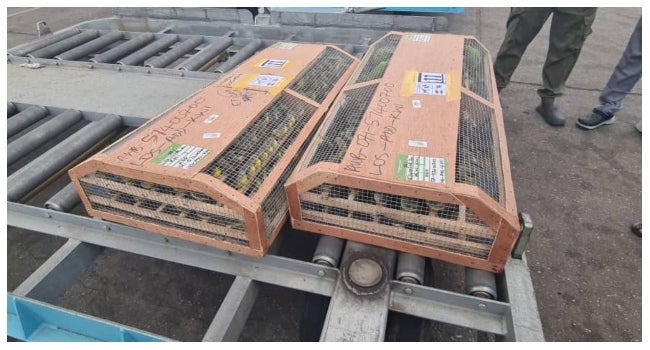Nigerian customs officials have announced one of the largest seizures of its kind in years, intercepting more than 1,600 parrots and canaries at Lagos international airport that were being illegally transported to Kuwait.
The live cargo, including ring-necked parakeets and yellow-fronted canaries, was intercepted by customs officials at the airport on 31 July, the agency announced late on Monday.
Michael Awe, a customs controller at Lagos airport, confirmed the birds lacked the mandatory CITES permit and other essential documentation required to prove their legal acquisition.
Nigeria, a signatory to the Convention on International Trade in Endangered Species of Wild Fauna and Flora (CITES), has become a significant transit hub for wildlife trafficking.
Parrots, songbirds, and birds of prey are among the most trafficked birds globally for the exotic pet trade, private collections, or for their feathers and trophies, according to the United Nations 2024 World Wildlife Report.

“No illegal shipment will slip through the cracks under my watch at the airport, because the eagle eyes of my command officers are everywhere to detect and intercept,” he said in the statement.
Awe said customs were investigating those responsible for the illicit cargo, adding that the birds would be handed over to the National Parks Service.
It is the latest group of animals to be intercepted by authorities after the Nigeria Customs Service, Federal Capital Territory (FCT) Area Command of the Nigeria Customs Service (NCS) recently announced 1,540 endangered birds were stopped from being illegally exported.
Speaking during the official handover of the birds to the National Park Service in Abuja, the Customs Area Controller of the FCT Command, Comptroller Chinwe Aliboh, revealed that the intercepted birds included 200 parakeets, 40 Hasbiya (pigeons), 390 yellow canaries, 130 Janwuya (red neck), 260 black birds, 130 white canaries (Farar Daka), and 390 Beni (Hausa).
In July, the MMIA Command also seized 75 bags of pangolin scales and two live pangolins.
Discussion about this post